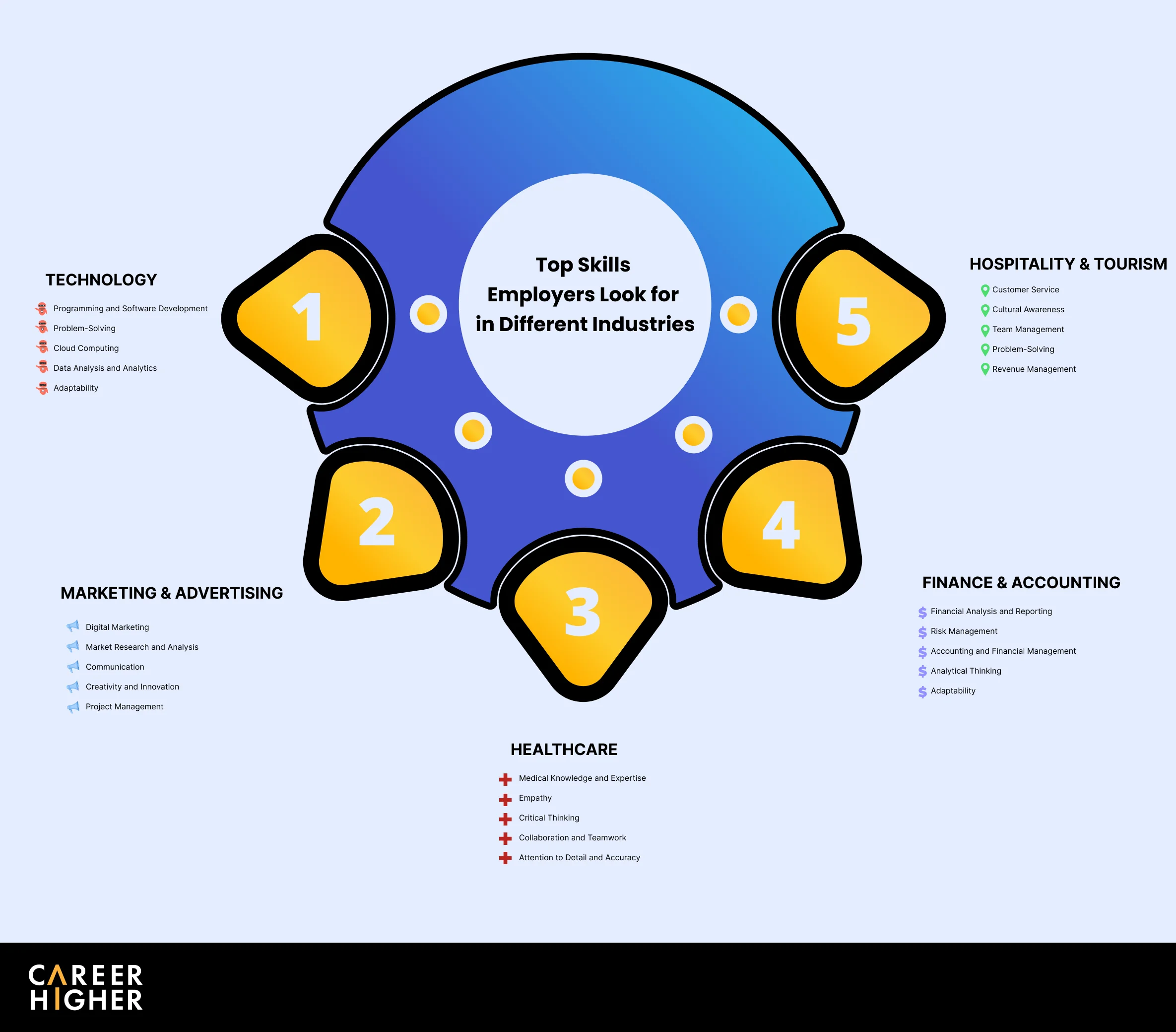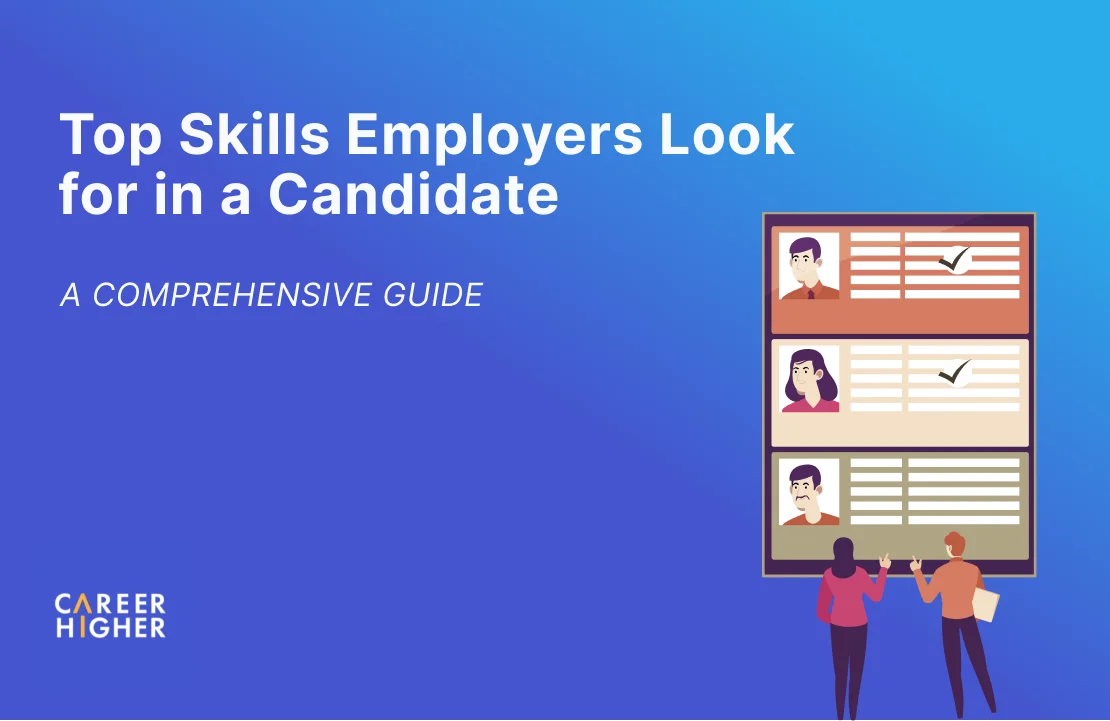Table of Contents
When you submit a job application, one of the first things that employers assess is whether you possess the right skill set to perform the job effectively. Thus, the skills you highlight in your career documents, and how you present them, are extremely important. So, which skills will help you catch the employer’s eye?
In today’s rapidly-changing environment, standing out from the crowd requires the job seeker to have more than technical knowledge. You need a good balance of hard and soft skills, to truly impress the hiring manager. In this guide, we have prepared a comprehensive list of top skills that employers are actively searching for in candidates. So, let’s get started!
Two types of job skills
There are two types of skills that employers look for in job applicants: soft skills and hard skills. Both these skills are necessary for an individual to perform their job effectively. Let’s understand what these two types of skills are:
a) Hard skills: Also referred to as technical skills, hard skills are the technical competencies and specific training you acquire through your education, professional experiences, or other learning experiences. For example, the ability to use a particular machine or a software program is a hard skill. These skills are typically more tangible and easy to quantify and assess.
b) Soft skills: Soft skills are personality traits and attributes that influence how you work, individually or with others. For example, your ability to communicate effectively is a soft skill. While technical skills can be acquired through training, soft skills are developed over time and are often more difficult to quantify or measure.
Popular soft skills employers look for
Soft skills are increasingly gaining prominence in the workplace as companies look to add more value to their businesses. According to a study, 93% of hiring managers said that soft skills were an “essential” and “very important” factor when making hiring decisions. Let’s look at the top 6 soft skills that employers look for in candidates:
1) Communication
Communication is undoubtedly one of the most important skills employers seek in candidates. Infact, a study conducted by Graduate Management Admissions Council states that oral communication is the ultimate skill employers look for in new hires. Excellent communication at the workplace is key for a seamless and hassle-free system between departments and teams. Open communication ensures that everyone is on the same page, allows room for concerns, and creates a safe space for dialogue. It is also essential for fostering an inclusive and open workplace.
Communication takes place in two ways, spoken and written. Both involve one’s ability to absorb, synthesize, and communicate information and ideas effectively. This involves asking the right questions and extracting what you need from an email, text message, phone call, or video chat and articulating your thoughts effectively to convey your message to the listener.
Here are some examples of communication skills:
- Presentation skills
- Active listening
- Public speaking
- Persuasion and negotiation
- Writing
2) Agility
In today’s fast-paced business world, work conditions can change quickly. Thus, the need for businesses and their stakeholders to adopt agile behavior has never been more pressing. Agility means being nimble and responding to change effectively and timely. Leaders have learned that agility helps organizations survive in unprecedented times. Today, employers look for the following skills to foster agile behavior in their teams:
- Adaptability
- Coping with uncertainty
- Growth mindset
- Learning & development initiative
Adaptability and coping with uncertainty are among the most employable skills, according to a recent study by McKinsey & Co. Both reflect an individual’s ability to accept, adjust and respond effectively to an unpredicted change. Employers actively seek individuals who can lead teams, projects, or individual tasks as the world of work evolves and changes.
A growth mindset is one of the essentials for agility skills. According to Dr. Carol S. Dweck, people with a growth mindset can acquire and improve skills and abilities over time with effort and practice. Having a growth mindset also enables them to demonstrate continued development through perseverance, and determination. Combined with a dedication to continuous learning and developing oneself, you are prepared to face any change or challenge.
3) Self-management
Self-management skills reflect an individual’s ability to control and regulate their emotions, behavior, and thoughts effectively in every situation. Employers prefer candidates with strong self-management skills as they better manage their feelings and behavior while dealing with key stakeholders like customers, clients, and colleagues. This ability underpins professional behavior and contributes to a productive workplace. Here are some examples of self-management skills are:
- Self-confidence
- Motivation
- Wellness and resilience
- Organization
Self-confidence and motivation are essential skills assessed by employers, especially during interviews. While the former allows you to take risks and hold your position, the latter enables you to work harder to achieve your deliverables and deliver on commitments. In a recent LinkedIn report, resilience is quoted to be one of the most important skills by L&D leaders globally. When combined, these skills enable you to manage yourself better as an employee, which employers highly value.
4) Interpersonal skills
Interpersonal skills are highly sought after by employers. Interpersonal skills help people interact and communicate in scenarios where cooperation and collaboration are essential. Employers look for candidates with these skills as they want candidates who can adjust well within teams. They help you understand people and adapt your approach accordingly, enabling you to flourish at any job. Strong interpersonal skills can help foster strong relationships and reduce conflicts.
Some examples of interpersonal skills are as follows:
- Empathy
- Active Listening
- Collaboration
- Responsibility
- Patience
- Dependability
- Flexibility
- Leadership
- Conflict Management
- Emotional intelligence
5) Cognitive Skills
Cognitive skills are mental capabilities that facilitate the acquisition of knowledge, manipulation of information, and reasoning. While we all exhibit cognitive processes, some cognitive skills are more suited for the workplace than others. Some examples include:
a) Critical thinking is the process of analyzing a problem, situation, or issue thoroughly based on evidence and relevant information. A critical thinker doesn’t readily accept information or conclusion at face value without examining the reasoning, method, or assumptions behind them. It is one of the essential skills for potential leaders. According to Helen Lee Bouygues, it is a learned skill and can be practiced in three simple steps:
- Question assumptions
- Reason through logic
- Diversify thought
b) Analytical thinking involves breaking down a complex concept into smaller parts to tackle the problem, make projections, and generate ideas. Analytical reasoning denotes the general aptitude to arrive at a logical solution to a given situation. Employers favor candidates with strong analytical skills as they are essential for developing and strategizing their operations.
6) Creativity and Innovation
Creativity and innovation are critical skills to have especially in today’s digital age. A company that values and nurtures these skills can be at the forefront of change, develop new offerings, and respond effectively to business challenges. Thus, the ability to think creatively and offer innovative solutions will make you a good problem-solver for any organization, regardless of the industry or the job role. Some examples of creativity and innovation skills are:
- Imagination
- Open-mindedness
- Originality
- Curiosity
- Critical thinking
Popular technical skills employers look for
In today’s rapidly evolving technological landscape, some hard skills have become invaluable for a company’s success. In the following section, we’ll explore the top 6 technical skills which can give you an edge in the job market:
1) Software development
Software development has become one of the most sought-after work skills that employers look for in this digital era. Software development involves creating, testing, and maintaining software systems designed to facilitate businesses to operate more successfully and efficiently.
As more and more companies develop and solidify their digital infrastructure, proficiency in various software technologies has become highly desirable. Some key examples of software development skills include:
- Programming languages: Python, Java, Javascript, C++
- Web development: HTML, CSS, Javascript
- Database management systems: MySQL, Oracle, MongoDB
- Agile methodologies: Scrum, Kanban
2) Automation
An emerging trend in the industry is hyper-automation. It is a process through which organizations automate complex business processes and operations using AI, low-code application platforms (LCAP), robotic process automation (RPA), and virtual assistants. These technologies are process-agnostic software, making them useful in multiple IT & business use cases in any industry.
There are several online courses and products on RPA, LCAP, and AI to learn more about hyper-automation. According to a report by Gartner Inc., the market for hyper-automation technologies will reach $600 billion in evaluation by 2022. Additionally, Technology specialists and automation test specialists are the top 2 of 10 in-demand jobs on LinkedIn. Some top automation skills include:
- Robotic process automation
- Scripting and programming
- Process analysis and design
- Artificial intelligence and machine learning
3) Blockchain
Blockchain is an unchanging, public register that records transactions and exchanges of any asset in a network. This technology has found its application as a ledger for cryptocurrencies. But it can be used to store and track information on the exchange of any asset or information. It can be applied to any closed or open network, where transparency and traceability are required to track a multi-step exchange of things.
The blockchain market is projected to increase from $4.68 bn in 2021 to $104.19 bn in 2028. Blockchain is a growing field and one of the top employability skills to learn. As countries look to regulate cryptocurrencies, the applications of blockchain technology have increased in business and commerce. In the realm of blockchain, several technical skills have gained popularity, some of these include:
- Blockchain architecture
- Blockchain integration
- Cryptocurrency development
4) Cybersecurity
With the increasing rise in cyber threats, companies are keen to hire professionals who can safeguard their digital assets. Cybersecurity involves protecting systems, networks, and programs from digital attacks. Cyberattacks are usually intended to access, change, or destroy critical systems & sensitive information, extort money from the user, or interrupt the business process.
The cybersecurity market is projected to grow from $165.78 billion in 2021 to $366.10 billion by 2028, at a compound annual growth rate (CAGR) of 12% during the period. The growth is mainly driven by the rise in e-commerce platforms and the advent of core technologies such as AI, cloud computing, or the Internet of Things (IoT). Market leaders are always looking for AI-supported cybersecurity experts. The following work skills are highly sought after by employers:
- Ethical hacking
- Knowledge of security frameworks and standards
- Network security
- Threat intelligence analysis
5) Digital Marketing
We are spending more time staring at screens than ever. As identified by a recent study, people in the USA spend 17+ hours in front of a screen every day. The organizations respond accordingly, with a constant increase in their digital marketing budgets. Marketing promotes products and services through the internet using devices such as smartphones, computers, tablets, etc.
The skills required to succeed in the digital marketing era are:
- Search Engine Optimization (SEO)
- Search Engine Marketing (SEM)
- Data-driven marketing
- E-commerce marketing
- Social media marketing
- Social media optimization
- Display ads
- Email marketing
- Copywriting
According to a report by grand research view, the digital marketing software market is expected to grow at a CAGR of 18.2%, from $56.52 billion in 2021 to $182.21 billion in 2028. Employers are keen on hiring quality talent for the coming surge in the digital marketing landscape. In a recent report from LinkedIn, the number of digital marketing jobs has increased by 63% in the first six months of 2021. Between June 2020 to 2021, there were 381,000 marketing jobs, including 17,000 remote jobs.
6) Data analysis
As companies generate and collect increasing volumes of data, the need for data analysis continues to grow. Data analysis involves inspecting, cleansing, transforming, and modeling information to uncover useful insights to support decision-making. Data analytics can help companies optimize performance and reduce costs. According to Wiley’s Closing the skill gap report, data analysis is among the most sought-after technical skills that employers look for in candidates. The key data analysis skills include:
- Data cleaning and processing
- Statistical analysis and data visualization tools
- Machine learning techniques
Top skills for different industries
In the above section, we have discussed a broad spectrum of top soft and hard skills employers look for in candidates. However, it’s important to recognize that every job role, function, and industry has its own set of preferred work skills. Thus, we suggest analyzing the job description and researching the industry to understand what are the top skills your target employer is looking for. We have compiled a list of top skills by the industry which can help you better understand the requirements of your chosen field:
- Top skills to highlight for marketing roles
- Top skills to highlight for finance roles
- Top skills to highlight for executive management roles
- Top skills to highlight for technology-related roles
- Top skills to highlight for project management roles
How to highlight skills on your resume
A resume is one of the most important documents during your job search. It enables your potential employer to assess your candidacy for the role and decide if you should move further in the recruitment process. In the following section, we provide tips on how you can highlight key job skills in your resume:
1) Analyze job requirements
Before you start writing your resume, it’s important to familiarize yourself with the key skills associated with the job you’re targeting. The best way to do this is to study the job description thoroughly. Typically, the job description includes a list of both the hard and soft skills the company is looking for in the ideal candidate.
2) Highlight key skills in your professional summary section
Focusing on the right skills in the professional summary section is a great way to grab the attention of hiring managers from the start. Use concise phrases in your summary section, to showcase your skills along with accomplishments and impact. Here is an example of a professional summary section in a resume:

In the above example, the candidate has done a good job of demonstrating key skills in the professional summary section. Soft skills, like empathy and excellent communication skills, are highlighted along with relevant context and examples. Also, hard skills such as being data-driven and having expertise in program planning and development are being effectively showcased.
3) Create a dedicated key skills section
The key skills section is the most important section to emphasize the relevant skills on your resume. It is one of the first places your target employer will look at to make sure you have the right skills for the job. We suggest including a mix of relevant soft and technical skills in this section, typically around 9-10 skills. Here is an example of a key skills section:

4) Showcase key skills in the work experience section
The professional experience section is a great place to showcase to your employer how you have leveraged your skillset and the results you’ve achieved. We suggest starting each bullet point off with an action verb that indicates which skill was employed during that particular event. Also, be specific about your responsibilities, actions, and achievements, quantifying your results wherever applicable. Here is an example of a bullet point in the professional experience section:

In the above example, the candidate has effectively demonstrated both soft and hard skills. Soft skills such as leadership, communication, and collaboration, are being demonstrated through specific examples. Also, the candidate has showcased proficiency in technical skills like project management and search engine optimization (SEO) with quantifiable results.

If you’re looking to set yourself apart in today’s highly competitive job market, you need to think beyond your qualifications and focus on the top job skills employers want. Also, remember to research the job role and the company, and focus on the skills relevant to you and the job position. To support your job search, you can browse through our career strategy library and learn more about different industries, identify the right employer, and optimize job search tools. If you need any support, we would be more than happy to help you.








